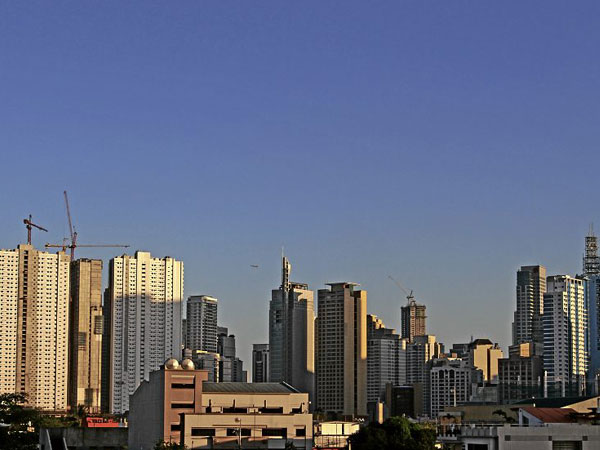
MANILA, Philippines — As lawmakers scrambled for pork and delayed the approval of the P3.7-trillion 2019 national budget, reenacted appropriations at the start of the year slashed 1 percentage point from the country’s economic growth potential in the first quarter, resulting in a four-year low gross domestic product (GDP) expansion of just 5.6 percent.
“As we have forewarned repeatedly, the reenacted budget would sharply slow the pace of economic growth. I was tempted say, ‘would wreak havoc on economic growth,’ but don’t use that,” Socioeconomic Planning Secretary Ernesto Pernia, the country’s chief economist, told a televised press conference, eliciting laughter from the audience.
But the country’s GDP performance between January and March was no laughing matter: Pernia, who heads the state planning agency National Economic and Development Authority (Neda), said that had this year’s budget been implemented on time, the economy should have grown by up to 6.6 percent during the first quarter.
Philippine Statistics Authority (PSA) data showed that the actual first-quarter growth rate was not only the lowest since the 5.2 percent posted in the first quarter of 2015, but also cut short 14 straight quarters of above 6-percent expansion.
As the government had less funds to spend owing to using programmed amounts under the smaller 2018 national budget, government spending growth slowed to 7.4 percent during the January to March period from 13.6 percent a year ago.
As such, Pernia cited that “public construction contracted by 8.6 percent—for instance, the Department of the Interior and Local Government’s construction of police stations and purchase of new equipment and the Department of Education’s repair and rehabilitation of school buildings were severely hampered.”
Finance Secretary Carlos Dominguez III, who heads the Duterte administration’s economic team, earlier said the government underspent over P1 billion on public goods and services daily when it operated under a reenacted budget.
It was only on April 15 that President Duterte finally signed the 2019 appropriations, after he vetoed P95.3 billion in projects that were not included in his administration’s priorities.
But the damage has been done. And who’s to blame?
Asked by the Inquirer during the press conference if the Lower House was specifically to blame, Pernia replied: “Your question answered itself.”
“I think our statement [against budget delays] is strong enough but polite. And we hope our colleagues in the legislature will be sensitive to what has happened. Because we had warned several times about the problem, the risks of a delayed budget enactment,” he said.
It also did not help that the Commission on Elections (Comelec) had been slow to act on the economic team’s request made last February to exempt from the ongoing election ban 145 big-ticket national projects on top of 603 Department of Public Works and Highways-led projects.
Moving forward, Pernia was hopeful that the country could still achieve its growth goal for 2019, especially as the implementation of major projects goes on full swing in the upcoming quarters post-elections while inflation eases and the economy harvests the fruits of the credit rating upgrade to two notches above investment grade—its highest-ever—recently awarded by S&P.
Pernia, who later told reporters that he used to play a lot of basketball, likened the economy to the country’s favorite sport—“basketball games can still be won with second-half performance.”
“To reach the full-year growth target of 6-7 percent, the economy will need to expand by an average of 6.1 percent over the next three quarters. This is still achievable given the current performance of the private sector and if the government sector is able to jumpstart and speed up the implementation of its new programs and projects,” Pernia said.
For Dominguez, the first-quarter GDP growth was a “decent expansion that has kept the Philippines among the ranks of the region’s fastest-growing economies,” he said in a statement.
“The budget impasse in the Congress during the year’s first three months had set off a spending cutback, which, in turn, stifled economic activity. Were it not for the Senate-House deadlock over the 2019 general appropriations bill, which forced the government to operate on a reenacted 2018 budget for the entire first quarter, the economy could have received a tremendous boost from what should have been much higher state spending on infrastructure modernization and human capital formation at the onset of 2019,” the Finance chief said.
“State spending fell by some P75 billion in that three-month period—based on an estimate of P1 billion per day—which meant lost opportunity to fund new infrastructure projects, a setback aggravated by the public works ban this election campaign period,” he added.
But for the rest of the year, Dominguez said “economic growth is expected to finish stronger over the April to June period and for the rest of 2019 as the government puts ‘Build, Build, Build’ on the fast lane following the passage of the 2019 general appropriations act and domestic consumption picks up amid cooling inflation.”
“The Duterte administration aims to offset the lower spending at the outset of 2019 resulting from the budget delay and the construction ban during the election season. Henceforth, we expect growth to pick up on higher state spending in continuance of last year’s upward momentum,” according to Dominguez. /cbb/muf

